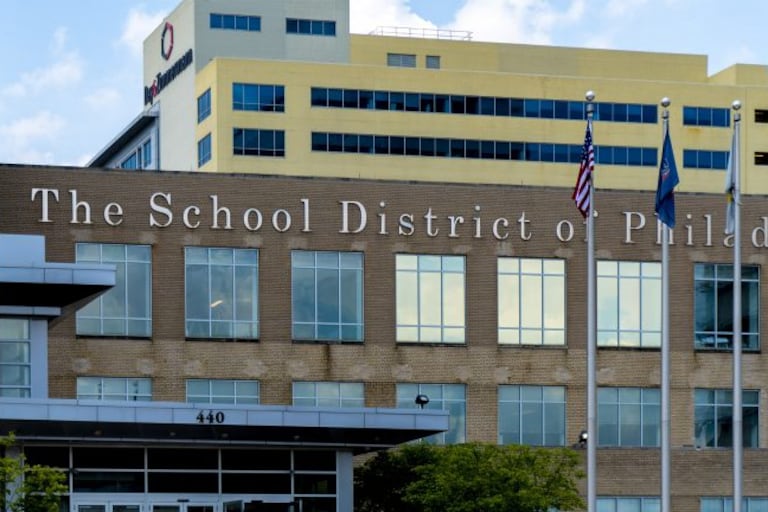The Philadelphia Board of Education took the first step towards closing a nationally recognized charter school that board members accused of discrimination in its lottery admissions system.
In a meeting that ran late into Thursday night, the board voted to send Franklin Towne Charter High School a notice of charter revocation, kicking off what could be a years-long process of hearings and investigations into the Blue Ribbon school.
Earlier in the week, the school district recommended that the board should start the process of revoking the school’s charter, citing evidence that Franklin Towne’s admissions process was not random and therefore may have systematically discriminated against students in majority Black neighborhoods.
“This decision is about ensuring that the school and its leaders are complying with required laws and regulations, as well as their charter, to implement a fair and equitable admission and lottery process that allows any student from any part of the city to have an equal opportunity to access public education,” Board President Reginald Streater said.
Streater said if a charter school is “picking and choosing” which students they enroll, “the credibility of the subsequent successes of that charter school could potentially be called into question.”
The board’s action comes amid the district’s own reckoning with its lottery admissions process for selective schools, in addition to longstanding accusations that the board discriminates against Black-led charter schools. Janice Hatfield, a spokesperson for the board, told Chalkbeat there has been no update on a law firm’s investigation into allegations of racial bias within the charter school authorization process.
The notice of revocation was approved 8-1 with board member Cecelia Thompson casting the dissenting vote.
Brianna O’Donnell, the CEO of Franklin Towne, said in a statement to the school community on Friday that the school district’s “revocation campaign is politically motivated” and accused the district of “trying to force as many charter schools back into its budget as it can.”
“We believe the facts and the evidence do not support revocation,” O’Donnell said, adding that even if, after rounds of hearings, the board does vote to revoke the school’s charter, “we remain confident in our likelihood of success on appeal.”
Earlier this week, O’Donnell said she was “blindsided” by the district’s move to begin revoking the school’s charter. She also said she was puzzled that the district was able to reach its conclusion before a probe by an outside group into the charter’s admissions practices commissioned by the school could be completed.
The 1,300-student school that serves grades nine through 12 will remain open and funded during the revocation process.
The city’s African-American Charter School Coalition issued a statement earlier this week welcoming “accountability” for Franklin Towne but added that it was “concerned by the timing.”
“We are still waiting for the Board to address the glaring bias and inequities in the charter evaluation and oversight process that continues to negatively impact Black founded and led public charter schools,” the group said in its statement.
District says charter school violated state law
In a memo dated Aug. 14, Peng Chao, the district’s acting chief of charter schools, reported that there were 17 city ZIP codes — some of which include majority Black neighborhoods — where no students were offered admission at Franklin Towne despite 110 students from those areas applying for the upcoming school year.
Chao said his office’s analysis revealed that Franklin Towne high school “has failed to conduct a lawful and compliant admissions and lottery process for students applying to the school over the course of the charter.”
Chao also said the school’s admissions process violated the enrollment section of the Pennsylvania charter school law, which says if more students apply to the school than the number of attendance slots available, students “must be selected on a random basis.”
Looking at a map of those ZIP codes, Board Vice President Mallory Fix-Lopez said Thursday she could only think of “a couple of words” to explain it: “offensive, redlining, racist practices.”
“I just don’t know how to look at that data and not interpret it any other way than a blatant racist practice that they have been on alert for for quite some time and just choose to ignore,” Fix-Lopez said.
Franklin Towne has been accused of discrimination in the past. In 2014 and 2016, Chao said at the board meeting, the district warned the school’s leaders that they were asking for inappropriate information on their application including the special education status of potential students.
And in 2018, the advocacy group Education Law Center - PA sent the school an open letter alleging discrimination against students with Individualized Education Programs, commonly known as IEPs. The school’s lawyer denied the allegations at the time.
Fix-Lopez also questioned whether similar non-random admissions processes are “pervasive throughout the city and other charter schools.”
Chao previously told reporters that his office is “looking into” doing such an analysis for other charter schools in the city. But, he cautioned, his office requested the same data from Franklin Towne’s charter elementary school and did not find anything that would indicate “a level of concern” on par with the high school.
Jennifer Clement, an assistant principal and long-time faculty member at Franklin Towne, told the board members that “punishing” students, families, and staff “for the alleged actions of a few” who oversaw admissions decisions would be “incredibly wrong.”
Two other Franklin Towne staff members shared sentiments similar to Clement’s on Thursday, emphasizing that the new administration under O’Donnell is still investigating its admissions process.
In February, before the discrimination allegations surfaced in The Philadelphia Inquirer, Joseph Venditti, Franklin Towne’s longtime CEO, resigned.
Board member Chau Wing Lam said she sees the revocation process as an opportunity to get more information, rather than as a definitive ruling about the allegations.
“I think it’s difficult to ascertain whether the violations that were uncovered are indicative of something more pervasive in the culture,” Lam said. But she added that if the allegations are true, “it’s analogous to cheating and it’s illegal.”
Just before voting, Streater said he understood that revoking the school’s charter will have an “unintended impact” on the students and staff.
Still, he said, “more must be done to remedy the situation to ensure that future students and applicants have an equal and fair opportunity to access Franklin Towne Charter High School.”
Carly Sitrin is the bureau chief for Chalkbeat Philadelphia. Contact Carly at csitrin@chalkbeat.org.






